New parents are looking for practical and functional solutions for arranging the child's room , and one of the most common myths encountered is that the baby's bed must be made of chipboard to be easier to maintain.
This belief is often passed on among parents as a useful advice to face all the hygienic challenges in the first years of the little one's life. However, it is important to know that the choice of materials from which the bed is made should not be based exclusively on ease of cleaning, but also on aspects related to safety and comfort.

The baby bed is a central element and among the first pieces purchased by parents, and these must be chosen carefully to ensure the comfort and safety of the little one. From a practical point of view, it is true that easy-to-clean materials are preferred, because they are prone to make a mess and spill different foods on the bed.
The choice of chipboard can raise certain concerns, because it is a material made of wood fibers compressed and glued together with synthetic resins. It can emit harmful chemicals such as formaldehyde, affecting the air quality in the room and risking the little one to have respiratory problems.
Chipboard is a hard and rough surface compared to other materials, which can be uncomfortable for a baby during sleep or play. Natural wood, as well as non-toxic plastic, can be a much better solution for the little ones, safer and more comfortable.
It is important for future parents to consider not only aspects related to maintenance, but more safety and comfort. Thus, a healthy and pleasant environment will be ensured, without making compromises in terms of hygiene and bed cleaning.



